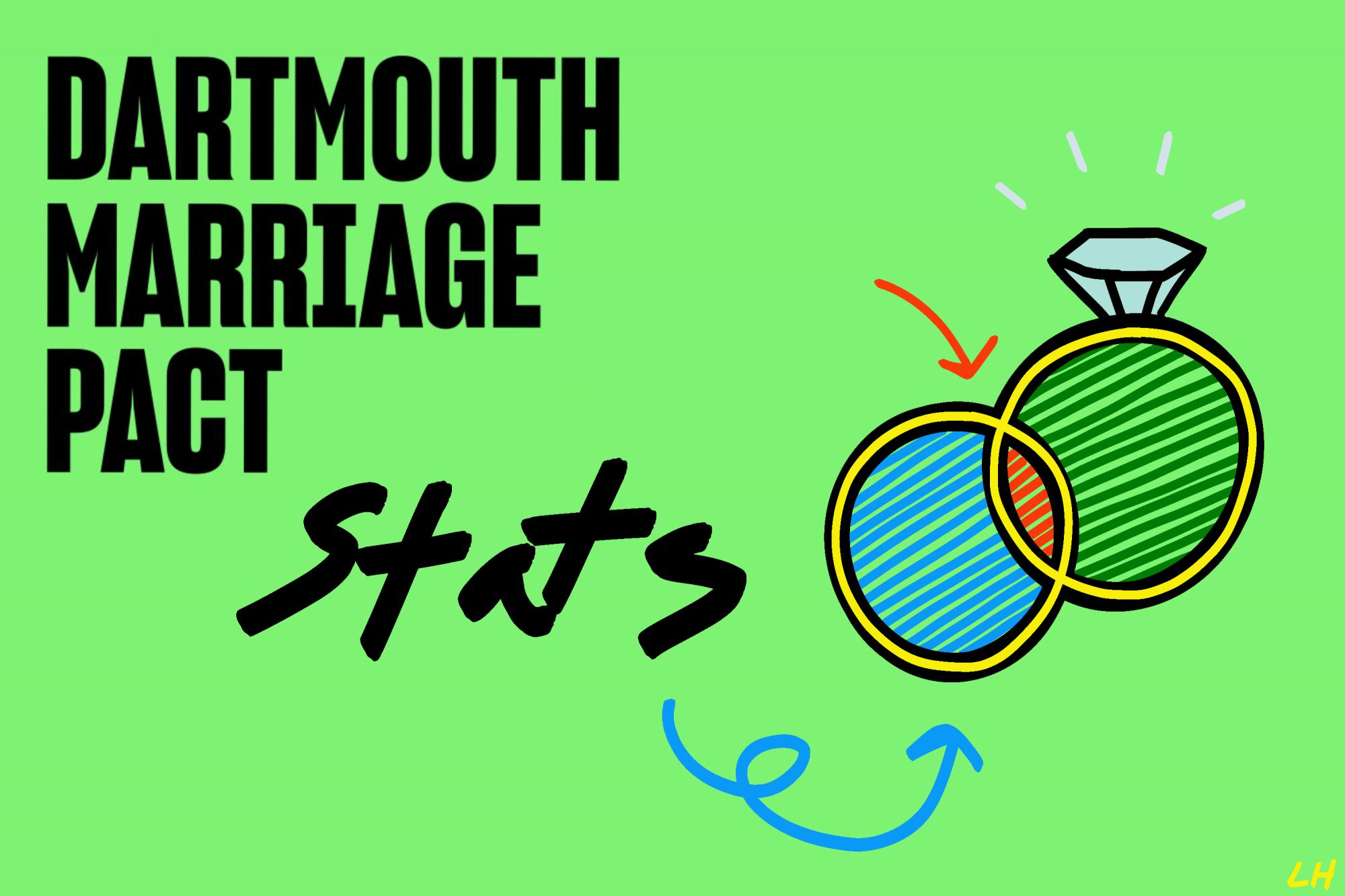Are you sick and tired of hearing about the Marriage Pact? Can’t bear the reminder of your meant-to-be soulmate who turned out to be nothing but a failed flitz, an awkward Novack run-in or the person in your building who you never noticed before but now somehow see everywhere? Well, you’ve come to the wrong place.
If, however, you’d like to wallow in your disappointment just a little bit longer, we have some news for you. Last month, the Marriage Pact released Dartmouth’s 2021 Campus Report, which promised to aggregate data from the fall Marriage Pact survey to shed light on campus quirks and trends. This year's report contained — to say the least — some shocking data points, and we’re going to try to unpack some of the most interesting findings.
If you happen to be unfamiliar with the Marriage Pact survey, it asked students a series of questions last fall about their personal and lifestyle preferences in order to gauge their compatibility with others. For most questions, students answered by selecting where they stood on a scale of one to seven. Afterward, the Marriage Pact algorithm worked its magic, eventually hoping to introduce students to their potential life-long partner. Although Marriage Pact was designed to assess individuals’ compatibilities, the collective answers to the questions also say a whole lot about Dartmouth students as a whole.
To get the ball rolling, the report showed that a high percentage of conservative students admitted that they would “do whatever it takes to get ahead,” only children were more likely to send back a dish at a restaurant and Econ majors — more so than any other major — found it “important that [they] make more money than [their] peers.”
The results of the “Are you smarter than most people at Dartmouth?” question are particularly intriguing, as there seems to be a strong divide in answers based on gender.
According to the report, men tended to see themselves as smarter than “most” other people at the College. By the looks of the chart provided by Marriage Pact, it seemed that almost all of the men who completed the survey put themselves in this “smarter than” category. This stands in contrast to only about a third of women and an even smaller percentage of non-binary people who answered affirmatively to the same question. But do Dartmouth men really think so highly of their intelligence relative to everyone else? To find out, we looked to students to investigate if this statistic aligns with their experience.
According to Simon Agnew ’22, the statistic doesn’t come as a shock — but he also doesn’t have any immediate evidence from his experience as a Dartmouth student to directly corroborate the statistic.
“I wouldn’t say that I see that attitude, but I’m not surprised by the response … that’s all I’ll say on that one,” Agnew said.
As Agnew suggests, maybe the men of Dartmouth don’t walk around proclaiming their intellectual superiority. However, is it possible that the anonymity of the survey led men, safe from criticism, to voice their true opinions of themselves?
When we polled our male friends, none of them admitted to saying they felt smarter than most Dartmouth students, which goes against the report’s overwhelming numbers. However, we know our friends to be honest people, so the jury may still be out on whether this statistic is really representative.
To continue our investigation, we took a closer look at a few of the other stats. One chart showed that about 65% of people who completed the Marriage Pact were “hitched” (dating someone). Furthermore, according to the report, most freshmen who filled out the survey were in a relationship — while most seniors were single. To us, the senior stat makes sense. One explanation could be that seniors in committed relationships would see no reason to fill out the Marriage Pact. However, the fact that most freshmen respondents said that they were in a relationship raised questions in our minds.
Alec Stern ’25 suggested that perhaps students have different definitions of what it means to be single, which might influence how they rate their commitment on a numerical scale.
“People’s interpretation of the scale could be different, you know?” Stern said. “A five could be more neutral to some people than other people.”
Some students expressed skepticism regarding Marriage Pact’s representation of the data.
“It seems like they just wanted reactions out of people,” Chandini Peddanna ’25 said.
Jack Schwartz ’25 expressed similar sentiments, but admitted that even if the data was dramatized, he “[liked] the way they did the graph” because he thought it added “a little shock factor.”
We also thought it was important to consider who elects to fill out the Marriage Pact. Just over half the student body — 2,316 students — filled it out. Not every student’s opinions were represented in the survey, and it’s likely that the half who responded were not a perfectly representative sample.
Furthermore, Schwartz pointed out that some groups of students may have been less likely to fill out the form.
“Bold take, hear me out: maybe athletes are less inclined to fill this out because they’re not as down bad,” Schwartz said.
In that case, maybe this data is missing a valuable athlete perspective. But who knows? There wasn’t an athlete category on the report. When we contacted Marriage Pact multiple times for more insight on the data, we never received a response.
Either way, we have to hand it to the Marriage Pact team. They seem to know what they’re doing with all these statistics — and they, in turn, have brought us a great deal of entertainment. So, take a look at the stats to see where you stand in the broader Dartmouth community, and, of course, continue to make awkward eye contact with your failed Marriage Pact match.



